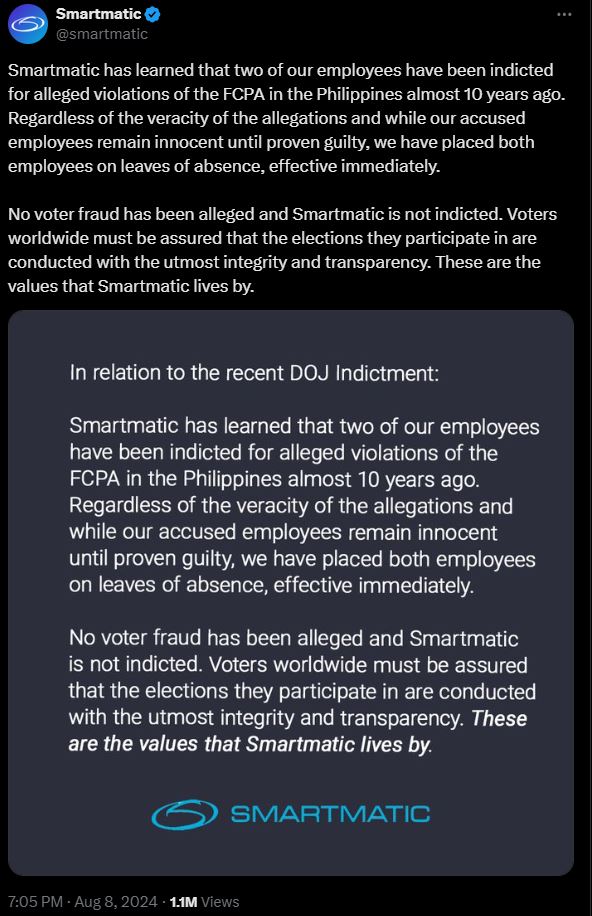WASHINGTON, D.C.— The United States Department of Justice on August 8 announced federal charges against executives of election voting machine company Smartmatic and former Chairman of the Commission on Elections (COMELEC) of the Republic of the Philippines for alleged bribery and a money laundering scheme related to the 2016 Philippine elections.

According to the indictment, between 2015 and 2018, Smartmatic’s president and co-founder, Roger Alejandro Piñate Martinez, 49, a Venezuelan citizen and resident of Boca Raton, Florida, and co-defendant Jorge Miguel Vasquez, 62, a U.S. citizen and resident of Davie, Florida, together with Elie Moreno, 44, a dual citizen of Venezuela and Israel, allegedly caused at least $1 million in bribes to be paid to Juan Andres Donato Bautista, 60, the former Chairman of COMELEC.
The bribes, according to DOJ documentation, were allegedly paid to obtain and retain business related to providing voting machines and election services for the 2016 Philippine elections and to secure payments on contracts, including the release of value added tax payments.
In a statement released on X that has 1.1 million views by the publication date of this article, Smartmatic states that the allegations are from “almost 10 years ago,” the employees have been placed on a leave of absence, that “no voter fraud” against the company has been alleged and that “Smartmatic is not indicted.”

Martinez turned himself in to U.S. authorities in Miami. He also resigned on August 8 as a managing director with SGO Corporation (formerly Smartmatic Limited)—a London-based venture capital company whose mission is “developing and implementing tools to enable governments and empower citizens in the digital age.”
The co-conspirators allegedly funded the bribes through a slush fund that was created by over-invoicing the cost per voting machine for the 2016 Philippine elections, the DOJ states.
Coded language was used to conceal and disguise the nature and purpose of the illegal payments. By means of fraudulent contracts and sham loan agreements, transfers were laundered through a “Philippines Pot” slush fund in bank accounts located in Singapore, Hong Kong, Switzerland, New York, and Florida where the federal grand jury indicted the men.

Martinez and Vasquez are each charged with one count of conspiracy to violate the Foreign Corrupt Practices Act (FCPA) and one substantive violation of the FCPA.
Bautista, Martinez, Vasquez, and Moreno are each charged with one count of conspiracy to commit money laundering and three counts of international laundering of monetary instruments.
If convicted, Martinez and Vasquez each face a maximum penalty of five years in prison for the FCPA and conspiracy to violate the FCPA counts. Bautista, Martinez, Vasquez, and Moreno each face a maximum penalty of 20 years for each count of international laundering of monetary instruments and conspiracy to commit money laundering.
As of the publication of this article, no Smartmatic voting systems are utilized in Washington state according to the Washington Secretary of State’s website.
Legal Complications and Election Integrity
Scott Greytak with Transparency International in Washington, D.C., said that on a prosecutorial level, this case comes down to evidence and strategy.
“It hinges on whether they’re using business accounts or business email addresses, or what kind of connections they can establish with the company itself,” Greytak said in an interview with Law.com in addressing why Smartmatic itself was not indicted. “A lot of this involved overseas shell companies, so there’s that evidentiary threshold.”
However, Joel Hirschhorn, with Hirschhorn Law Office, believes that DOJ’s unorthodoxly charging Smartmatic executives instead of the company was due to the advocacy of lawyers and lobbyist in D.C. and New York.
“As a result, the Justice Department would proceed against the companies, while senior executives, who were actually responsible for the misconduct, often escaped accountability,” Hirschhorn told law.com. “The reality is that companies and corporations only act through individuals.”
The indictments and/or arrests of Smartmatic executives will most likely complicate the pending and settled defamation lawsuits against media outlets Newsmax, Fox News, and OANN, My Pillow founder Mike Lindell, and former New York City Mayor and Trump-ally Rudy Giuliani over election fraud claims related to the 2020 U.S. Presidential election.
Smartmatic was founded in Boca Raton, Florida, by Venezuelan citizens Antonio Mugica, Alfredo José Anzola, and Roger Alejandro Piñate Martinez in 2000. The company was chosen to replace voting machines ahead of the 2004 Venezuelan elections that resulted in Hugo Chavez’s reelection victory.
In 2017, Smartmatic’s CEO made statements suggesting that the results of Venezuela’s election for an all-powerful 500-member constituent assembly were off by at least 1 million votes, which fueled further discord over the election’s integrity in Venezuela.
“That stupid guy, the president of Smartmatic, pressured to the neck by the gringos and the Brits, said there were 7.5 million [voters],” Venezuelan president Nicolas Maduro said in televised remarks according to The Guardian. “I think there were 10 million Venezuelans who went out.”
Antonio Mugica, the chief executive of London-based Smartmatic, stood by his claims of election interference against the Maduro camp.
Since 2004, Smartmatic election technology has been used in local and national elections in Africa, Argentina, Belgium, Brazil, Bulgaria, Chile, Ecuador, Italy, Mexico, the Philippines, Singapore, the United Kingdom, the United States and Venezuela. The company has worked with the Carter Center in auditing elections around the world.
Author: Mario Lotmore












